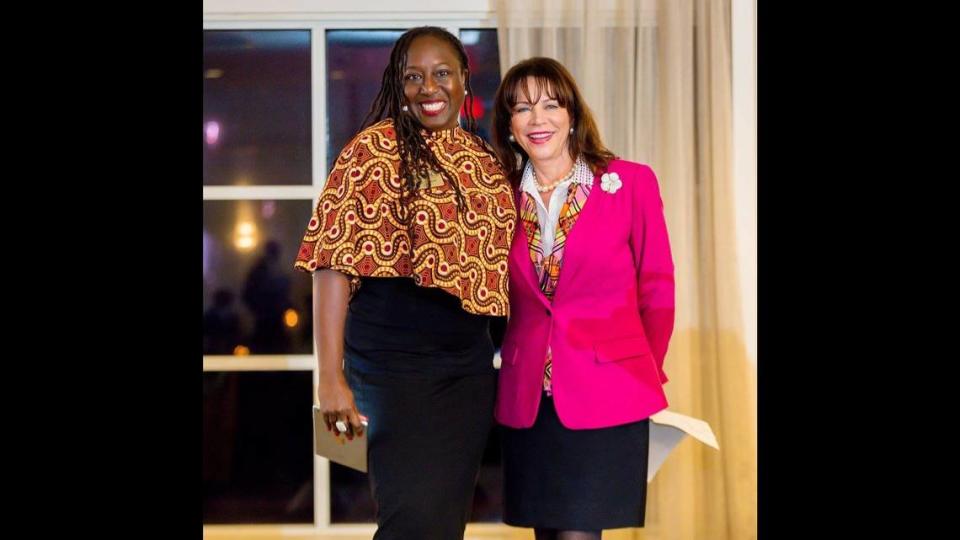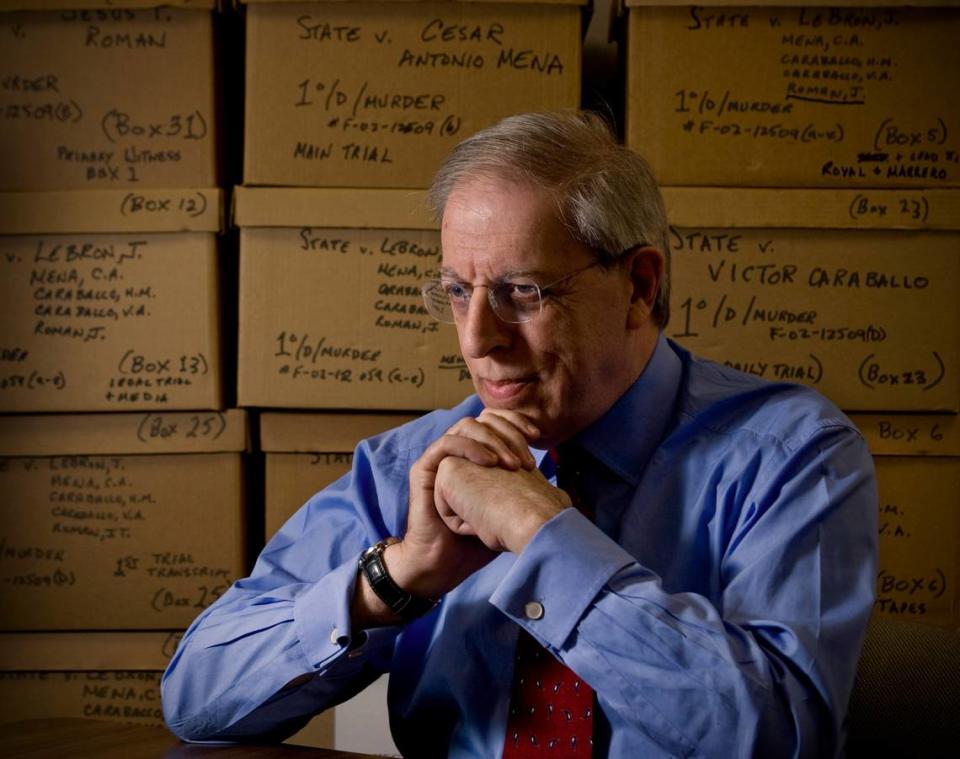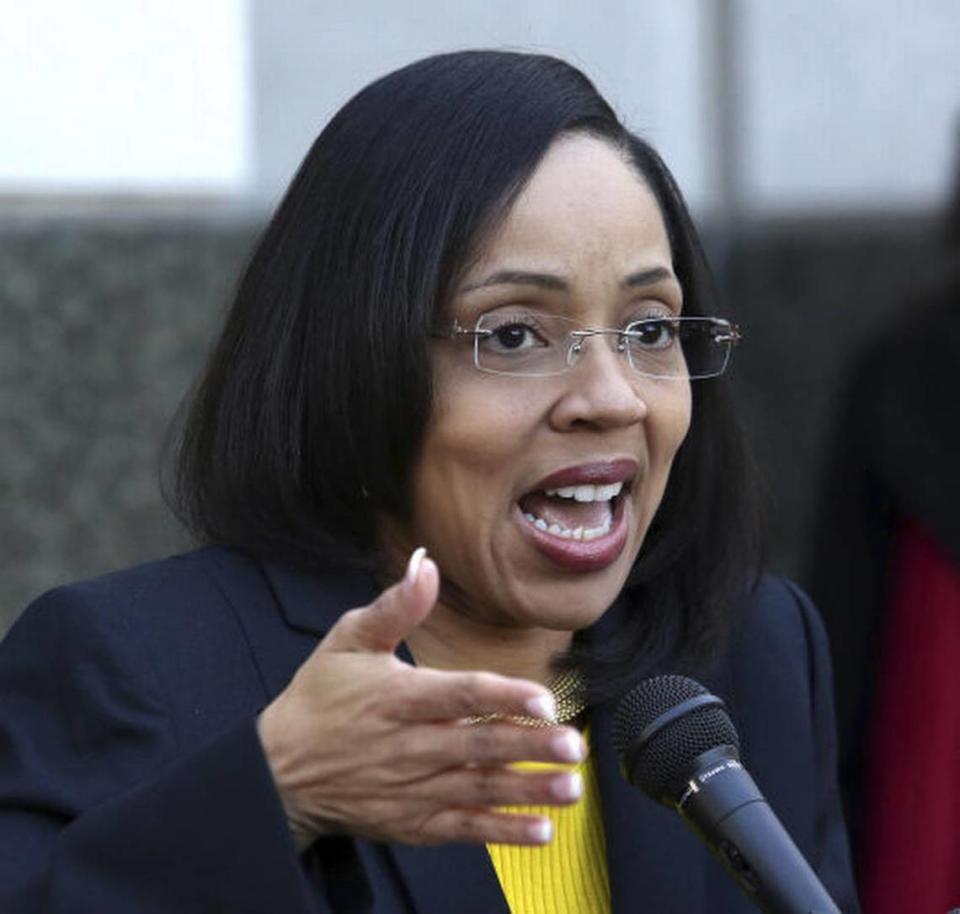From mentee to challenger: Melba Pearson targets ex-boss, Miami’s longtime state attorney
After 16 years as a prosecutor, Melba Pearson stood before a crowd of fellow lawyers celebrating her departure from the job at a Miami riverside restaurant and singled out the woman who hired her: Miami-Dade State Attorney Katherine Fernández Rundle.
“Kathy, thank you so much for being amazing, for being a role model,” Pearson said. “For encouraging me to blossom.”
More than three years later, Pearson is again calling out Fernández Rundle — this time in hopes of taking her job as Miami-Dade’s elected top law-enforcement officer.
Since leaving the state attorney’s office as its assistant chief of the career criminal division to join the American Civil Liberties Union in 2017, Pearson has gone from confidant to critic, painting her former boss as out of touch with national criminal-justice reforms and supportive of a system that unfairly targets Black defendants. She’s attacked the state attorney’s record on police brutality and shooting cases — and vowed to re-open cases that Fernández Rundle declined to prosecute.
“I have no ill will toward her. I don’t hate her. I still like her as a person. I wouldn’t say she’s a horrible person. It’s that our leadership styles are different,” Pearson, 47, said of her ex-boss. “And I intend to win.”
But after leaving the nest, Pearson is finding it difficult to make her campaign fly against her former mentor. And though her reform-minded campaign is seemingly built to capitalize on the growing Black Lives Matter movement, she enters the final month-and-a-half before the Aug. 18 primary election far down in the polls, without the support of Miami’s grassroots organizations and facing questions about her ability to win a race that, while between two Democrats, will be decided by voters of all persuasions.
On one hand, Pearson’s campaign and criminal justice platform appear to be fortuitously timed: she carries the criminal justice mantle as Fernández Rundle faces heated criticism over her office’s handling of police killings and in-custody deaths. On Tuesday, the Miami-Dade Democratic Party attempted to put its thumb on the scales for Pearson by calling on Fernández Rundle to suspend her campaign over the “staggering failures of the State Attorney to hold law-enforcement accountable.”

On the other, Pearson’s campaign has been strapped for cash, undercut by a coronavirus pandemic that has driven down the economy, made fundraising particularly difficult for challengers and all-but canceled grassroots campaigning. Progressive groups, meanwhile, appear to have done little to fund Pearson, and her hopes of an infusion of cash from a group backed by billionaire activist George Soros were never realized.
In Miami, where ethnic politics and surnames often sway elections, the numbers don’t favor Pearson. Under Florida law, because the August election features only the two Democrats, the race is open to independents and Republicans too — and most political observers believe Miami-Dade’s overwhelmingly Hispanic, conservative summer-voter pool will lean toward the familiar, less liberal name.
Pearson would be the first African-American State Attorney in Miami. Fernández Rundle, who has been in office since 1993, is Cuban American.
A poll conducted in late June by SEA Polling and Strategic Design found Pearson well behind Fernández Rundle, who held a 48% to 17% lead among likely August primary voters.
Fernández Rundle held double-digit leads among Democrats and independent voters. But her strength was most notably among Republicans, who tend to vote in high percentages in Miami’s historically low-turnout August elections.
“The whole nature of this race changed the whole moment the primary was left open,” said pollster Tom Eldon, who said he conducted the poll on behalf of a private client unassociated with either campaign. “If this were a Democratic primary you might see some tighter numbers. But Kathy Fernández Rundle is doing well among GOP voters.”
Eldon questioned whether the cash-strapped Pearson campaign has the time or money to eat into Fernández Rundle’s lead.
“It’s one of the strangest times you can ever be in a campaign, running against a long-term incumbent and you can’t knock on doors, can’t have rallies, can’t have meetings. It makes it tough,” Eldon said. “Also this whole business about leaving the primary open, that always makes a simple primary a trickier proposition. You have to communicate to a lot more voters. GOP voters tend to out-turnout Democrat voters in August primaries.”
Pearson’s Legal Career
A graduate of Hofstra University School of Law, Pearson worked in 1997 and 1998 as a certified legal intern with the State Attorney’s Office, then returned as a prosecutor in 2002 after passing the Bar exam on her third try.
During her time at the office, Pearson worked prosecuting domestic-violence crimes, then relaunching a Community Prosecution Unit, intended to “find creative solutions to prevent crime and provide outreach,” according to her bio. Pearson’s last role was assistant chief of the Career Criminal Robbery Unit.
Pearson left the office in early 2017 to become the deputy director of the ACLU of Florida. There, Pearson worked on a host of criminal-justice issues, including the ultimately successful campaign for Florida’s Amendment 4, which restored voting rights for many felons.
Pearson and Fernández Rundle remained friendly. Fernández Rundle supported the ACLU’s Amendment 4 efforts. Two years ago, Pearson even got Fernández Rundle to introduce her at an event installing her as the president of the Gwen S. Cherry Black Women Lawyers Association.
Pearson said she decided to leave for the ACLU after Donald Trump was elected president.
Rodney Jacobs, a Democratic activist and the assistant director of Miami’s Civilian Investigative Panel, said he’s not bothered by Pearson’s history under Fernández Rundle — or her flattering characterizations of Miami’s top prosecutor on her way out the door.
“You don’t go from the State Attorney’s office to the ACLU unless you have a heart for doing civil justice work,” Jacobs said. “Our state attorneys have a large influence in how we do criminal justice in America. If you’re going to change it, you’re probably better to do it from the inside.”
The Decision
So what drove Pearson to run against her former boss? For one, Pearson said, the State Attorney Office’s lukewarm response to an ACLU study on racial disparities in Miami-Dade.
But the main issues were Fernández Rundle’s decisions to not file criminal charges in two major cases: the hot-shower death of prison inmate Darren Rainey, and the case of ex-Hialeah Police Officer Jesus Menocal, who was accused of sexually assaulting young women while in uniform.
“In the case of Darren Rainey and Jesus Menocal, charges could have easily been filed and they weren’t,” said Pearson, who worked under Fernández Rundle when the state declined to file charges in the Rainey case; Pearson was not involved in the investigation. “And that to me is systemic of a rapid decline of the State Attorney’s Office.”
Fernández Rundle has countered that her ethical obligation as a prosecutor prevents her from filling criminal charges when there isn’t enough evidence to prove a case beyond a reasonable doubt. And in police-shooting cases, Florida law is crafted to give officers a wide berth to use deadly force.
Pearson told the Miami Herald that her former boss is simply afraid of losing at trial.
“There has to be that political will to be like, ‘Listen, some of these cases need to go to the jury. You may lose some of these cases. It doesn’t mean it was wrongfully filed,” Pearson said.

That approach has riled current and former Miami-Dade assistant state attorneys, including former senior prosecutor Abe Laeser, who spent 36 years in the office. Laeser is no fan of Fernández Rundle — he still chafes that she did not re-hire him after he left as part of an early retirement program.
But Laeser said Pearson “could not be more wrong” about filing cases without being able to prove a crime.
“No citizen — police are citizens — should go through the dubious pleasure of being charged with a crime, post bail, see their story in the news, have friends and family be embarrassed forever, spend their life savings to defend themselves, for the honor of having a quick acquittal,” Laeser said.
“Every prosecutor fears the prosecution of the legally innocent. Ms. Pearson should have learned that during her stint as an assistant state attorney, and saying otherwise is demagoguery.”
A Tough Road
Pearson had hoped to follow the path of Aramis Ayala, the reform candidate who in August 2016 bested her own boss: Orlando State Attorney Jeff Ashton. Political committees backed by Soros spent $1.4 million in the race, running TV ads during the Olympics.
(Ayala drew the wrath of the Florida governor and the Florida Supreme Court after declaring she would not seek the death penalty on any murder cases; she is not seeking a second term).

Soros-backed committees, including the Justice & Public Safety political action committee, gives money to prosecutor races across the country. Pearson said she “had conversations” with the committee and was disappointed she didn’t get its support, but understands resources are finite.
“I never went in to this banking on so-and-so is going to drop a million in my account,” Pearson said.
In recent weeks, Pearson has parted ways with her initial campaign manager and Ben Pollara, the political consultant who recruited her to run. Pearson’s direct campaign raised $122,000 through June 26, and has already spent $98,000.
Real Reform for Miami-Dade, a political committee formed by Pollara, raised just $2,751. Pollara had initially told the Herald the group had secured commitments for $50,000 in donations.
In contrast, Fernández Rundle — as deeply entrenched as any politician in South Florida — has raised $525,000, spending just $55,000 so far. A political committee called Citizens for Justice, which supports Fernández Rundle, has raised another $133,000.
Money aside, local political observers believe that hopes of Pearson winning were all but dashed when the window to make the Aug. 18 ballot closed last month with only Pearson and Fernández Rundle having qualified — opening the election to all voters, regardless of party.
Campaigns sometimes stealthily recruit otherwise irrelevant write-in candidates to “close” single-party primaries to only voters of a specific party, but that didn’t happen in this race. The tactic was used eight years ago by Democrat defense lawyer Rod Vereen, who recruited two write-in candidates in hopes of capturing enough of the black Democratic vote to beat Fernández Rundle in the primary. He still lost.
Vereen, who is supporting Fernández Rundle this year, said that while the Black Lives Matter movement has changed the dynamic of the race, it may not be enough.
“I still think Melba has a huge hurdle to overcome,” Vereen said. “This is still Miami. Hispanics still have a history of bloc voting. The fact that Melba didn’t get the Republicans out of the race has tipped the scales in favor of Kathy.”
Pearson doesn’t agree. “I look at races around the country. People want criminal-justice reform. It’s a bipartisan issue.”
Pearson though, doesn’t appear to have received the support of left-leaning organizations and activists that often get behind Miami’s progressive candidates. Color of Change, an organization that seeks to push prosecutors races to the left, has not backed Pearson, but on Wednesday endorsed Joe Kimok in the race for Broward state attorney. Prominent activist and musician John Legend also tweeted Wednesday in support of Kimok, but said nothing about Pearson.
Fernández Rundle likely has something to do with that. Legend stood with her in court last year when she unveiled a “rocket docket” to help felons restore their voting rights. And when Fernández Rundle learned Pearson was seeking Soros money, she lined up her own face-to-face with Whitney Tymas, the head of the Soros-funded Justice & Safety PAC.
Fernández Rundle didn’t get the group’s support. But neither did Pearson.
Other grassroots organizations pushing for criminal-justice reform, such as New Florida Majority, have also been forced to decide which areas of the state they’ll focus on while unable to canvas neighborhoods on behalf of candidates and issues they support.
“We’re trying to get to consensus,” said Dwight Bullard, political director for New Florida Majority, noting Kimok’s candidacy in the race to claim the Broward state attorney’s position being vacated by Mike Satz. “Who’s going to support who and where? What’s the appetite and the attitude? Not to mention there are state attorney’s races all over the state.”
Despite the limitations, Pearson has continued campaigning through Zoom meet-and-greets, phone calls to voters and radio and podcast appearances. In recent weeks, she’s gotten help from Miami documentary filmmaker Billy Corben, who has used his immense social-media platform to campaign for Pearson and release videos lambasting Fernández Rundle.
Pearson says if elected, she wants to overhaul the office. Among the changes she wants to make:
▪ Overhaul the “felony screening unit,” the group of lawyers that evaluates whether to file formal charges on new cases filed by police departments, cases that are eventually passed on to prosecutors assigned to individual courtrooms. She says she favors a more “vertical” model that would entail prosecutors keeping cases.
“You file less crappy cases if you have to handle them later on,” Pearson said.
▪ Stop filing misdemeanor marijuana possession cases, and felony cases of possession with intent to sell. Fernández Rundle’s office last year announced it would no longer file on misdemeanor case because police cannot differentiate between cannabis and now-legalized hemp.
“I want to focus on gun crime. I want to focus on sexual assault,” Pearson said. “I want to focus on the violent crime that’s tearing apart the community.”
▪ Push county leaders to allocate more money to social services. Asked about recent movements to “defund” the police, Pearson said she favors re-allocating money because cops are asked “to do way too much with skills they don’t even necessarily have.”
But, she said, “I’m not in favor of abolishing the police.”

